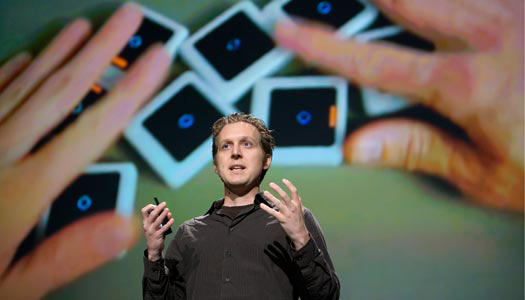
David Merrill is a grad student in the Fluid Interfaces Group at MIT’s Media Lab. He and his fellow students in this group work on new technologies that give us more and better abilities to do things we want to do. At TED2009 he gave a demo of his main project, Siftables.
Today the TED Blog interviewed Merrill to get some details about the Siftables project — and answers to some questions that many have asked since his demo. Here’s a snippet:
I have heard so many people say: “My kids will love these. When can I get some?” The realization has been hitting us over the past few months that the potential for kid-oriented interactions is huge and meaningful.
Find the full interview with David Merrill below the fold >>
Full text of email interview with David Merrill (2/23/09):
A sound problem interrupted your live talk — but everyone noted how you kept your cool. What’s the secret?
I have been in blues and rock bands since I was a teenager, and there’s nothing like performing in front of big audiences over and over to cure any trace of stage fright. The sound problem was just like having a band-mate break a guitar string, and whenever that happened during a concert I’d have to stall for time while he fixed it and keep the audience with me in exactly the same way.
You’re in China now, looking at manufacturing possibilities for Siftables. What grabbed your interest?
The electronics market in Shenzhen is amazing — it’s a fabulous bazaar for technology geeks.
There’s something satisfying about the clatter of Siftables on a tabletop. But how hardy are they?
Siftables are pretty durable little guys. We worked with Amit Zoran (of the MIT Media Lab) and Noah Murphy-Reinhertz (of polysaturated.com) to make the plastic housings, and they have been working really well — we haven’t had any break on us yet. However, one of the things that we’ve seen at every factory is the drop-test rig, and I think we probably have a little more robustification to do before dropping heavy objects onto them.
Earlier on in the design cycle, what was something you tried that just did not work?
We initially made little charging docks — one for each Siftable. They were cute and they mostly worked, but they complicated the design of each Siftable block. We continue to learn that simple solutions are usually the best ones.
Many people are wondering whether Siftables are going to be openly programmable. What do you think?
I can’t say much about this now, but stay tuned. There are a lot of creative people out there, and we would love to enable them to design interactions for Siftables.
Let’s say you had an extra minute on stage. Is there anything you’d like to add?
I think one of the things we ought to be focusing on as we design the next generation of interaction technology is its potential for amplifying our expression. My working definition of the expressivity of a tool or instrument is how effectively it enables an idea to be made into a reality. The definition works as well for new interfaces as it does for musical instruments, and building tools that close the gap between the creative impulse and a realized instantiation of that impulse is my life’s work. Moreover, the delight that we feel when playing musical instruments is a target to strive for in the area of human-computer interfaces.
You’ve gotten a huge response from both the TED community and from the public. Is there something you’ve been hearing that you’d like to address or expand on?
I have heard so many people say: “My kids will love these. When can I get some?” The realization has been hitting us over the past few months that the potential for kid-oriented interactions is huge and meaningful. Someone else likened them to the Speak-N-Spell, but for the children of the 21st century. I like that comparison, since I have great memories of that device and I think its educational impact was important. If we can make a similar contribution I’ll be very happy.
Credit: TED.com
Watch David Merrill demo Siftables >>
Comments (1)